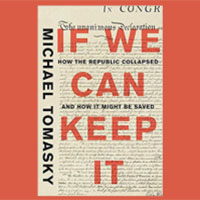— Book review by Jens Kruse —
On September 17, 1787, the final day of the Constitutional Convention in Philadelphia, so the story goes, a woman approached Ben Franklin and asked him: “Well, doctor, what have we got – a republic or a monarchy?” He supposedly answered with a challenge: “A republic, if you can keep it.” “That challenge,” says Michael Tomasky – a columnist for the Daily Beast and a regular contributor to the New York Review of Books — “bears down on us today in a way it rarely has in our history” (xxvii).
If We Can Keep It is his attempt, as he puts it, “to answer two simple questions:
- Why and how did the American political system fall into this state of horrible dysfunction?
- Can it ever be fixed?” (xix)
He warns us that the “answers aren’t simple or satisfying” (xix), but the two lists that precede his “Introduction” give us a hint what one of the dominant themes will be. They are entitled “A Chronology of Polarization” and “A Fourteen Point Agenda to Reduce Polarization,” which is also a part of his
concluding chapter: “If We Can Keep It: A Fourteen Point Agenda to Reduce Polarization.”
That chapter attempts to answer his second question; the preceding six chapters attempt to answer the first. Their titles are descriptive enough to give the reader the broad contour of the history that brought us to our current predicament: (1) “The True History of Our Not-Very-Representative Democracy;” (2) “We Were Always Polarized;” (3) “America in the Age of Consensus;” (4) “Coming Apart;” (5) “More Consumers Than Citizens;” (6) “From Gingrich to Trump: the System Explodes.”
These chapters make interesting, and often depressing, reading. They delineate: how the constitutional system that Franklin and the other delegates at Philadelphia crafted was visionary in some ways, but also contained flawed compromises that, over time, have become more and more problematic; that polarization has been the norm, not the exception, in our societal and political life; that the era of consensus from, roughly, 1933 to 1980, was forged by the Great Depression, World War II, and the Cold War; that, after that, social, economic, technological, and cultural, and political forces began, in accelerating fashion, to drive us apart. In his chronology Tomasky sorts our history into four ”ages”:
- “The Age of Creation, 1787-1865;”
- “The Age of Power, 1865-1929;”
- “The Age of Consensus, 1933-1980;” and
- “The Age of Fracture, 1980-Present.”
In his last chapter, he develops his “Fourteen Point Agenda to Reduce Polarization.” His suggestions for political fixes include ending partisan gerrymandering, bringing back at-large congressional elections, introducing ranked-choice voting, expanding the House of Representatives, eliminating the filibuster, getting rid of the electoral college (or making it obey the popular vote), and reviving moderate Republicanism.
Tomasky warns that all of these steps will be difficult to achieve and, even if achieved, will take time to have corrective effects. Nor would these political fixes be sufficient. They would have to be accompanied by social changes. For these, he proposes the following: creating “foreign” exchange programs
for students within the United States; reducing college to three years and making the fourth year a service year; finding a way to expand these ideas to high schools and into the workplace; vastly expanding civics education; insisting on a left that doesn’t contribute to the fracture; demanding that corporate and business leaders commit to social responsibility.
When Tomasky gets ready to conclude his book he does not mince words. If you have time to read nothing else, read just his last six paragraphs. I will leave you with the first and the last two of these six:
If We Can Keep It will end where it started. We are in trouble. Our political culture is broken, but it is not broken for the reasons you often read: that it’s broken because “Washington” is “dysfunctional,” or because politicians have no “will.” No. It’s broken because some people broke it. It was broken by the people who pushed an economic theory on the rest of us that has driven trillions of dollars that were once in the middle-class people’s pockets to a comparative few at the very top. Who refused to invest in the country anymore. Who will not even negotiate real investment. Who have been telling us for years that the market will take care of all our needs, while the market has in fact left thousands of towns and communities strafed and full of people addicted to drugs – the drugs, by the way, that that same free market is pumping out in vastly greater quantities, and for vastly greater profit, than it did twenty years ago. And who have built a up a parallel media universe in which any of these commonsense assertions are dismissed as socialist, and in which anyone who doesn’t endorse the thesis of Donald Trump’s greatness is
denounced as un-American.
(…)
Where do we go from here? Eventually the Age of Fracture will end, and a fifth age will loom before us. What will we call that age? We might be able to call it the Age of Repair, if we act to repair things. And if we don’t … I don’t wish to be melodramatic, but there is no law of the universe or heaven that says that democratic republics have to last forever. They must be kept alive. Ours is dying. And a young generation is coming of age that doesn’t have much faith in the American Dream, capitalism, or democracy. And based on what they’ve seen, why should they? All their lives, they have seen growing inequality and increasing dysfunction.
We know what the problems are. And we know what the solutions are. We know what it will take to keep the republic. The only thing we don’t know is whether the people who have the power to keep it will decide it’s finally time to do so. (235-237)
If We Can Keep It: How the Republic Collapsed and How It Might
be Saved. (New York: Liveright Publishing, 2019) can be checked out from the Orcas Library. It is available through Darvill’s Bookstore.
**If you are reading theOrcasonian for free, thank your fellow islanders. If you would like to support theOrcasonian CLICK HERE to set your modestly-priced, voluntary subscription. Otherwise, no worries; we’re happy to share with you.**









I agree with the thesis that the republic is collapsing. That it is serious life-threatening and cannot go unaddressed..
But at its birth it was the result of a compromise that allowed a fractured union of Northern and Southern colonies required to achieve a critical mass for separation from the British Empire..
at the expense of devaluing most of the [black] residents of the Southern colonies. How long could this last? Well, about 100 years. Then Civil War, retrenchment of reconstruction, and continued enslavement by other names..
yet another hundred years further along, the Empire now collapsed, and we are still fighting over whether we, as a nation are “white” or mongrel ..So yea. If we are not struggling to live out our principles, we are dying, or S N A F U :: T R U M P. Own it.
I always get upset when I read or hear someone espouse getting rid of the Electoral College.
It’s more important than you may think, and the Founders put it there for a good reason.
Back in the 1700s, a political philosopher named Jeremy Bentham created a new governmental proposition, which he called Utilitarianism.
He postulated that the best form of government would be one which provided “the greatest good for the greater number.”
English grammar aside, what Utilitarianism would bring us would be what later became known as “the tyranny of the majority.”
That “greater number” would always prevail in any controversy, even were it by only one person’s vote. A simple majority would always rule.
But what of the remaining 49% minority? Don’t their needs count at all? Not in Utilitarianism they don’t.
Our Founders knew about Bentham and his Utilitarianism, and, in their wisdom, they decided that even the minority’s needs must be considered.
Thus, the system they gave us includes needs to compromise, and to broker power.
One of the mechanisms given us to accomplish this necessary power brokerage is the Electoral College.
Before you rush to eliminate it from our government, remember that your viewpoint will also, someday, be that of the minority. That’s when you’ll be glad that you didn’t get rid of that pesky Electoral College.